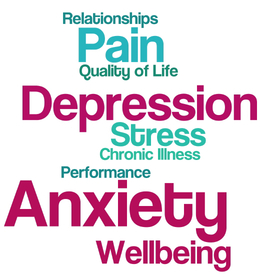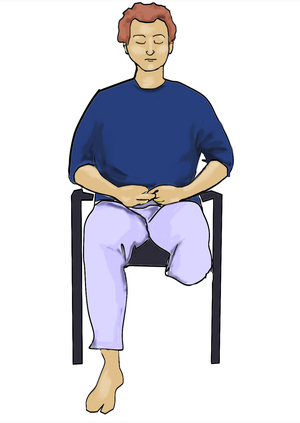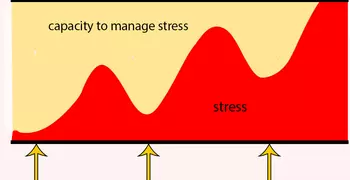What Are the Benefits of Mindfulness?


You have likely seen a headline or magazine cover touting the benefits of mindfulness for everything from better health to increased productivity at work. The New York Times reveals that “Being Mindful Can Help Guide a Decision.” The Huffington Post shares an Olympic medalist’s “10 Mindfulness Tips for World Record Success, Health and Happiness.” CNN’s Anderson Cooper says that mindfulness “actually is a very easy way for you to live longer.” Mindfulness appears to be the cure-all!
It is enough to make anyone a skeptic. And not without reason! In the midst of the media excitement around mindfulness, it is important to look honestly at what the research shows. To do this, we look mostly at what are called summary or review sources—systematic reviews and meta-analyses that evaluate the individual research studies and base their conclusions on the quality of the evidence, as well as the quantity.
Because these types of review articles search for all the available studies on a topic, appraise their quality, and summarize the results, they are an excellent way to get a more complete and less biased view of the evidence.
What does the evidence indicate?
From the summary sources, some consensus is emerging on the effectiveness of mindfulness for specific conditions:
- Depression, stress, and anxiety.
Recent reviews agree that mindfulness has a moderate to “robust” effect on depression, stress, and anxiety, which is a strong finding in the world of medical research! One group of researchers liken the effect of mindfulness for depression to that of anti-depression medications—without the side effects—and exhort physicians to talk with their patients about considering a meditation program to address psychological stress. Another group of researchers noted that of the 17 studies included in their review, “16 demonstrated positive changes in psychological or physiological outcomes related to anxiety and/or stress.”  Pain
Pain
There is moderate evidence that mindfulness has an impact on pain, particularly with the psychological experience of pain. A 2014 review in the Journal of the American Medical Association found moderate evidence of the effectiveness of mindfulness interventions for pain, but the relief varied across pain conditions. Another recent critical review of the literature in the journal Pain Medicine found that most studies show a positive connection between mindfulness-based practices and pain intensity.- Overall health and wellbeing
A 2014 "evidence map" done by the Veterans Administration in the US also found effects on overall health and chronic illness for those who went through an MBSR program (as compared to control groups that did nothing). Likewise, a 2012 Campbell Collaboration systematic review concluded that MBSR not only has a moderate and consistent effect on a number of measures of mental health for a wide range of target groups, it appears to improve measures of personal development such as empathy and coping, enhance quality of life, and improve some aspects of physical health, including chronic illness. - Performance
Research has suggested that practicing mindfulness may be associated with enhanced attentional control and working memory, and may improve cognitive performance, such as problem solving and decision making. In addition, the practice of mindfulness is associated with greater self-awareness and emotional control, which can contribute greatly to teamwork and conflict resolution.
Where are there still questions?
The VA "evidence map" also identifies a number of areas where the evidence is not as clear, largely because the studies are not randomized control trials or have other issues. These include: substance use, eating disorders, smoking, multiple sclerosis, PSTD, mood disorders, hot flashes, and sleep. This doesn’t mean mindfulness is not potentially helpful with these conditions, just that the evidence isn’t as strong.
How can mindfulness help you?
The research suggests that mindfulness has the potential to help people who seek a variety of goals, including regulation of stress and help dealing with physical pain and symptoms of chronic disease, as well as increasing effectiveness at work or school and in relationships.
We will address each of these in forthcoming sections, identifying how mindfulness might help, examining the evidence of effectiveness, and offering guided meditations that address the goal.

Practice awareness in daily life
Mindfulness is as simple as picking a task and paying attention, bringing a fresh sense of curiosity to the activity.
Practice Mindfulness in Daily Life
Follow these guidelines:
- Pick a daily task, such as brushing your teeth, cleaning up after meals, taking a shower, or even driving.
- Take a few mindful breaths.
- As you do the activity, notice how you move and how your body feels.
- If you like, from time to time, tune in to your breathing.
- If a feeling about the activity arises, notice it as well.
Tip: Bring a sense of exploration and curiosity to this activity. Remember not to judge yourself or others, but accept what arises. If you make a mistake or something doesn’t go as expected, can you simply observe the way things are right now?

Breath exercise
Try this 1-minute breath and body integration exercise.

Sue used mindfulness to address stress
Sue's story illustrates the impact that prolonged stress can have on health and how mindfulness can help.
Sue's Stress
Consider Sue's story, which illustrates the impact that prolonged stress can have on health. Sue was a bright and talented high school student. She had always been healthy and done well in school. In the past year, she added more activities, including early morning swim practice, a college prep class, a role in the school play, and work on the school yearbook. She knew her schedule would be really busy, but she enjoyed all of the activities.
What happened?
Because of her busy schedule, Sue seldom ate dinner with her family. Her meals often consisted of fast food. She started drinking soda to boost her energy. At night, even though she was exhausted, she couldn't sleep because her mind was racing. She started getting sick and missing school, first because of strep throat and then mono. She also started having severe stomachaches.
How were Sue's health issues addressed?
Sue's pediatrician diagnosed her with irritable bowel syndrome and offered her some medication to relax her gut. But Sue's mother felt strongly that she didn't want her to take medication.
Instead, she began to work with Sue on her schedule and habits. She insisted that Sue cut one after-school activity and be home for dinner at least four nights a week. She took Sue to a yoga class, where Sue began learning how to work with her breath, and to focus on the moment without fixating on worries about things that were out of her control. In the mornings before swim practice, she began doing 10 minutes of seated meditation with her mother.
After addressing the stress, Sue was still very busy, but she slept better, had more energy, and her stomach problems disappeared.
Boccia, M., Piccardi, L., Guariglia, P. (2015). The meditative mind: A comprehensive meta-analysis of MRI studies. BioMed Research International; 2015. Article ID 419808.
de Vibe, M., Bjørndal, A., Tipton, E., Hammerstrøm, K.T., Kowalski, K. (2012). Mindfulness based stress reduction (MBSR) for improving health, quality of life and social functioning in adults. Campbell Systematic Reviews.
Eberth, J., Sedlmeier, P. (2012). The effects of mindfulness meditation: A meta-analysis. Mindfulness; 3(174), 174-189.
Goyal, M., Singh, S., Sibinga, E.M., Gould, N.F., Rowland-Seymour, A., Sharma, R., et al. (2014). Meditation programs for psychological stress and well-being: a systematic review and meta-analysis. JAMA Intern Med; 174(3), 357-68.
Gu, J. (2015). How do mindfulness-based cognitive therapy and mindfulness-based stress reduction improve mental health and wellbeing? A systematic review and meta-analysis of mediation studies. Clinical Psychology Review; 37, 1–12.
Hempel, S., Taylor, S.L., Marshall, N.J., Miake-Lye, I.M., Beroes, J.M., Shanman, R., et al. (2014). Evidence map of mindfulness. Washington (DC): Department of Veterans Affairs (US); VA Evidence-based Synthesis Program Reports. VA-ESP Project #05-226.
Khoury, B., Lecomte, T., Fortin, G., Masse, M., Therien, P., Bouchard, V., Chapleau, M.A., Paquin, K., Hofmann, S.G. (2013). Mindfulness-based therapy: A comprehensive meta-analysis. Clin Psychol Rev.; 33(6), 763-71. doi: 10.1016/j.cpr.2013.05.005.
Kok, B., Waugh, C., Fredrickson, B. (2013). Meditation and health: The search for mechanisms of action. Social and Personality Psychology Compass; 7(1), 27–39.
Reiner K, Tibi L, Lipsitz JD. (2013). Do mindfulness-based interventions reduce pain intensity? A critical review of the literature. Pain Med. 14(2):230-42
Sharma, M., Rush, S.E. (2014). Mindfulness-based stress reduction as a stress management intervention for healthy individuals: A systematic review. J Evid Based Complementary Altern Med.;19(4), 271-86.


















